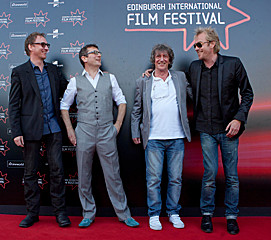I refuse to believe that programmers at the Film Festival didn’t plan Tuesday night on purpose. It was only when I picked up my tickets that I noticed I was going to see the Howard Marks biopic Mr Nice, and stoner-comedy High School on the same night. I don’t know if I’m being paranoid, but I did feel like someone somewhere was stifling a giggle at that bit of programming genius.
High School was good. A decent comedy starring the motley crew of Adrien Brody, Colin Hanks and Sean Marquette (who reminds me a little too much of Jonah Hill), it’s about two kids who get the whole school stoned in order to pass a random drug test imposed by fuhrer-tastic Principal Gordon. It has the right amount of good, evil, funny and downright dumb to keep an audience happy, but sadly, after Mr. Nice, it kind of felt like hearing a teenager say that Stephanie Meyer invented the vampire (when clearly it was Joss Whedon). Howard Marks’ autobiography, Mr Nice, did much to popularise the plight of the stoner in nineties popular culture, and no doubt helped to inspire the rise of the stoner-flick, from Half-Baked to Pineapple Express, so that it took this long to be captured on film is highly unusual.
It is the fruit of many years spent struggling with the BBC over how best to tell a story about a man who’s most famous achievement was smuggling vast amounts of marijuana into the country over the course of about fifteen years. The director, Bernard Rose, doesn’t speak about the BBC’s involvement with any regret, though, and said in a Q&A after the film that everyone at the BBC wanted it to be made, but the representation of the subject matter simply relied too heavily on the politics of the party in power at the time.
The film that comes before us now is BBC free (as they eventually sold the book rights on), and Rose has done a beautiful job with it. This is a story about drugs that isn’t about drugs. Rose instead chooses to focus his attention on Marks’ life, his relationships, his friendships and his family. He is an honest and decent man, who just happens to smuggle drugs, in large quantities, and deal with the IRA. He has a family and a wife, and does his best to provide for them. There are points throughout the movie where Marks is successful and wealthy, but gets too drawn in by the thrill of the job, and these are followed with the appropriate fall from grace. Though he is sly, and at times irresponsible, he pays his dues and we are left liking the character. To be honest, he seems pretty, well, nice.
Rhys Ifans plays Marks effortlessly, and it is only when they were introduced side-by-side that I realised how alike they look. Ifans and Marks are longtime friends (ever since Ifans asked Howard Marks to sign his pack of skins at a Super Furry Animals gig), and apparently they had decided long ago that Ifans would be the one to take up the role should Mr Nice ever be immortalised on screen. David Thewlis also features, as IRA man Jim McCann. His performance is stellar, and he has never been farther than Remus Lupin, let me tell you. The film is worth watching for his performace alone.
Rose also plays with the visuals in order to communicate the years that pass on screen. He said very pointedly that ‘titles on screen are a lazy way to direct’, and so in Mr. Nice, the texture of the film changes as the film progresses. As Rose made clear, ‘the only record that we have of this time is the visual artefacts we are left with’ and so our concept of the past is shaped by these. The film begins in the late fifties, in grainy black and white, then, when Marks sparks his first joint at Oxford University, the film turns to the beautifully rich colours that 60s and 70s cinema are famed for. The format also changes accordingly throughout the film (though I can only properly classify the last few), and by the end of the film, it could be shot on contemporary DV, with stark naturalistic lighting and that pin sharp/still home-made DV quality. What is odd about this film is that it is the fabrication of historical artefact. This is a movie adaptation of an autobiography, which simulates media no longer use in order to emulate an era we have record of only through film and archival footage, which is a wholly simulated medium in itself.
Okay, I have talked myself into a hole and it is late, so I am going to open this one up to the floor.
What do you feel are the implications of imitating a era-specific film format to create a work of autobiography, that is also fiction?
Does this somehow change the underlying message of a film, or can it be employed simply for aesthetic purposes?
How do you feel about the biopic versus documentary debate? Should I just be quiet and enjoy the movie?
You decide!















Comments